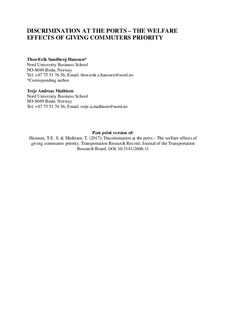| dc.contributor.author | Hanssen, Thor-Erik Sandberg | |
| dc.contributor.author | Mathisen, Terje Andreas | |
| dc.date.accessioned | 2018-02-28T14:04:32Z | |
| dc.date.available | 2018-02-28T14:04:32Z | |
| dc.date.created | 2017-09-28T10:13:18Z | |
| dc.date.issued | 2017 | |
| dc.identifier.citation | Hanssen, T.-E. S. & Mathisen, T. A. (2017). Discrimination at the ports. Welfare effects of giving commuters priority. Transportation Research Record, 2606, 79-85. doi: | nb_NO |
| dc.identifier.issn | 2169-4052 | |
| dc.identifier.uri | http://hdl.handle.net/11250/2487805 | |
| dc.description | Author's accepted version (post-print). | nb_NO |
| dc.description | Available from 01/04/2018. | |
| dc.description.abstract | In transport, the problem of demand exceeding capacity often takes place with congestion as a result. The resulting delays imposes substantial efficiency loss. Price discrimination by peak-load pricing is a well-recognized way of handling the problem. Such schemes are, however, often politically controversial because it might disadvantage vulnerable groups of passengers. An alternative is the use of a priority scheme. In this paper, a framework positioned within the traditions of cost-benefit analysis (CBA) is established to analyse the welfare effects of granting one group of passengers’ priority on transport modes characterized by limited capacity and low frequency. The case is a trial arrangement initiated at a rural car ferry crossing in Northern Norway ensuring that local commuters (traveling to and from work) can board at the desired departure. With respect to pricing, it is a stated objective of the road authorities that fares and discounts at ferries are equal throughout the nation. Hence, it is neither desirable nor legal for local political authorities to ensure local commuters a predictable transport alternative by price discrimination. The empirical evidence demonstrates that loss of social welfare caused by congestion problems at the port can be potentially reduced by introducing such a priority scheme. Recommendations are provided with regard to the required number of users required for the priority arrangement to render a positive net benefit for society. This ex ante information is useful for policy makers when evaluating whether to initiate such priority schemes to reduce efficiency loss in passenger transport markets. | nb_NO |
| dc.language.iso | eng | nb_NO |
| dc.publisher | National Academy of Sciences | nb_NO |
| dc.title | Discrimination at the Ports - Welfare Effects of Giving Commuters Priority | nb_NO |
| dc.type | Journal article | nb_NO |
| dc.type | Peer reviewed | nb_NO |
| dc.description.version | acceptedVersion | nb_NO |
| dc.subject.nsi | VDP::Samfunnsvitenskap: 200::Økonomi: 210::Bedriftsøkonomi: 213 | nb_NO |
| dc.source.pagenumber | 79-85 | nb_NO |
| dc.source.volume | 2606 | nb_NO |
| dc.source.journal | Transportation Research Record | nb_NO |
| dc.identifier.doi | 10.3141/2606-11 | |
| dc.identifier.cristin | 1499429 | |
